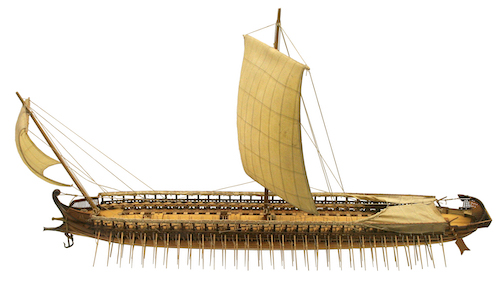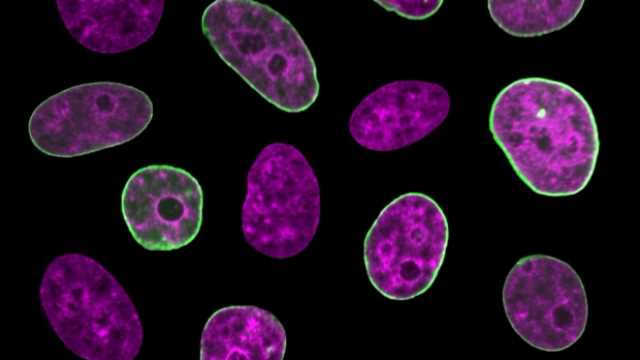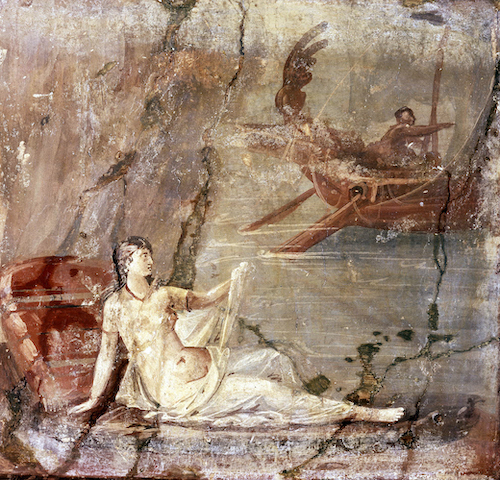But perhaps the most eloquent explanation of this timeless thought experiment was accomplished by the historian, biographer and essayist,
Plutarch.
The concept goes like this:
After a famous battle the
legendary Theseus has his ship moored in a harbor as a museum piece. Over the years parts of the ships, such as the wooden planks, begin to rot and need to be replaced. The question then is if all the parts of the ship are restored, at what point is the ship no longer that of Theseus… but instead becomes a new ship?
Likewise, if all the original materials are preserved and one day used to build a boat, is that then the true ship of Theseus?

Model of a Greek trireme. Credit: Deutsches Museum, Munich, Germany.
To quote Plutarch directly:
“The ship wherein Theseus and the youth of Athens returned from Crete had thirty oars, and was preserved by the Athenians down even to the time of Demetrius Phalereus, for they took away the old planks as they decayed, putting in new and stronger timber in their places, insomuch that this ship became a standing example among the philosophers, for the logical question of things that grow; one side holding that the ship remained the same, and the other contending that it was not the same.”
— Plutarch, Theseus
But for our intents and purposes, I’d like to stick with the philosophy of the mind and how we determine who we are…
After all, we inhabit many versions of ourselves, constantly changing, evolving, progressing. Our mindset and ideas develop over time, but even on a microscopic level we have to ask who are we – really? After all, at one point every single one of our cells has been replaced.

Ever changing human cells
So considering this ever constant state of change – and the fact that we are all works in progress rather than complete and static persons – I’ll present this week’s question:
Who are you? What makes you YOU?
Moreover, which you is ‘who’? The person you are today? Ten years ago? Or in the future?
And which aspect of you is ‘I’? Are you your thoughts and feelings? Your physical body? Or the culmination of your actions?












2 comments
Hallo there!
I like the idea of the ship where every plank can be replaced, but it still stays the same ship.
It’s the same with the cells in our bodies.
All of us are also the same for basically 99 per cent of the time — in a genetic sense.
All of us must do the normal things. We have to eat, grow and everything else…
We have to take care of ourselves.
We have to evolve, and one can always do that in an intellectual sense. The worst thing that one can do to one self is to lock up one’s intellect, like with some indoctrination of some kind.
One can always change or evolve there. Life is about about growth, development and evolution.
Each one of us have the ‘planks’ and all the other common things that one must take care off, but each of us have a special part, or special parts — some secret, or secrets, that are locked up in our genes that has to be discovered and evolved for someone to truly become him or herself…
Pieter J (PJ)
Gold and Fire
Everyone needs gold and fire;
They’re everybody’s biggest need, biggest desire…
Gold will enable one by giving one wings, the freedom that one needs to become, to become what one can be while one is being driven by the fire, the dreams, that burns from within one’s inner-self, one’s innermost being.
It’s that fire that burns within one’s heart, mind and soul.
It’s that fire that energises one, that enables one to create something worthwhile, that enables one to derive meaning from life. It must never get quenched! Never!
Nothing else will provide one with a meaningful life; a life worth living. When the fire gets quenched and the smoke is cleared away then the life that’s left will just be a burden, a burden that’ll get heavier by the day for as long as its bearer keeps on existing without experiencing any real life…
Keep the fire burning on the inside; use it to evolve, to grow — to keep on living, living for real…
Explanation: One must not quench one’s fire, or one’s talents, with indoctrination that’ll not value them.
One must unlock the secrets, and that special secret, of one’s genes that make one to become the best version of one.
Also see previous statement…
Pieter J (PJ)
Our apologies, you must be logged in to post a comment.